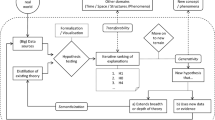Abstract
The project MASIVE (Multi-Agent Systems Interactive Virtual Environments) is the multi-agent extension of our Interactivist-Expectative Theory on Agency and Learning (IETAL). The agents in the environment learn expectations from their interactions with the environment. In addition to that, they are equipped with special sensors for sensing akin agents, and interchange their knowledge of the environment (their intrinsic representations) during their imitation conventions. In this paper we discuss the basics of the theory, and the social consequences of such an environment from the perspective of learning, knowledge dissemination, and emergence of language.
Access this chapter
Tax calculation will be finalised at checkout
Purchases are for personal use only
Preview
Unable to display preview. Download preview PDF.
Similar content being viewed by others
References
Bozinovski, S., Stojanov, G., Bozinovska L., “Emotion, Embodiment, and Consequence Driven Systems”, 1996 AAAI Fall Symposium, FS-96-02 (1996) 12–17.
Byrne R.W.„ Russon, A.E. “ Learning by Imitation”, Behavioral and Brain Sciences (2001).
Ferber, J: Multi-Agent Systems: An Introduction to Distributed Artificial Intelligence, Addison-Wesley, 1999.
Nehaniv, C., Dautenhahn, K. Mapping between dissimilar bodies: Affordances and the algebraic foundations of imitation. Proceedings of the Seventh European Workshop on Learning Robots Edinburgh, UK (1998) pp. 64–72.
Piaget, J Play, Dreams, and Imitation in Childhood. New York: Norton,. 1945.
Rizzolatti G, Fadiga L, Gallese V, Fogassi L, Premotor cortex and the recognition of motor actions. Cognitive Brain Research, 3(2) (1996) 131–141
Stojanov, G., Bozinovski S., Trajkovski, G “Interactionist-Expectative View on Agency and Learning”, IMACS Journal for Mathematics and Computers in Simulation, North-Holland Publishers, Amsterdam, Vol. 44 (1997).
Stojanov, G., Trajkovski, G., Bozinovski, S. “The Status of Representation in Behavior Based Robotic Systems: The Problem and A Solution”, IEEE Conference Systems, Man, and Cybernetics, Orlando (1997).
Thorndike, E.L. “Animal intelligence: an experimental study of the associative process in animals” Psychological Review Monograph 2(8) (1898) 551–553.
Trajkovski, G., Stojanov, G., ”Algebraic Formalization of Environment Representation“, in (Tatai, G., Gulyas, L. (eds)) Agents Everywhere, Springer, Budapest, HU (1998) 59–65.
Trajkovski, G., Goode, M., Chapman, J., Swearingen, W., “Investigating Learning in Human Agents: The POPSICLE experiment”, KES 2002, Crema, IT (to appear).
Author information
Authors and Affiliations
Editor information
Editors and Affiliations
Rights and permissions
Copyright information
© 2002 Springer-Verlag Berlin Heidelberg
About this paper
Cite this paper
Trajkovski, G. (2002). MASIVE: A Case Study in Multiagent Systems. In: Yin, H., Allinson, N., Freeman, R., Keane, J., Hubbard, S. (eds) Intelligent Data Engineering and Automated Learning — IDEAL 2002. IDEAL 2002. Lecture Notes in Computer Science, vol 2412. Springer, Berlin, Heidelberg. https://doi.org/10.1007/3-540-45675-9_41
Download citation
DOI: https://doi.org/10.1007/3-540-45675-9_41
Published:
Publisher Name: Springer, Berlin, Heidelberg
Print ISBN: 978-3-540-44025-3
Online ISBN: 978-3-540-45675-9
eBook Packages: Springer Book Archive




